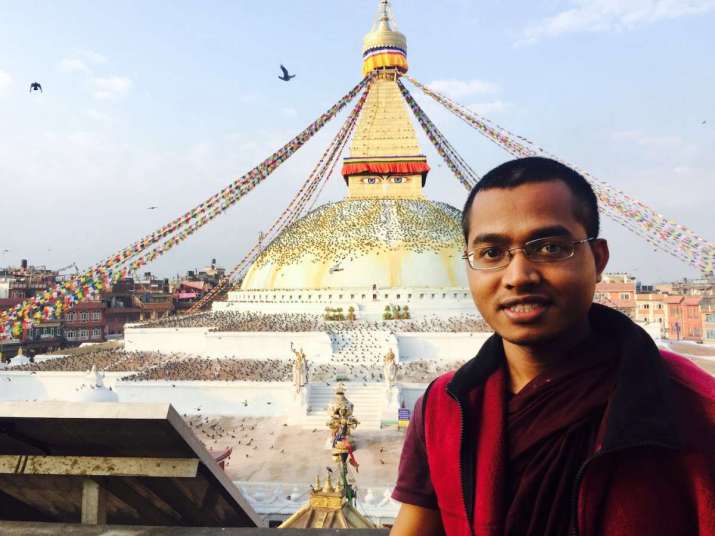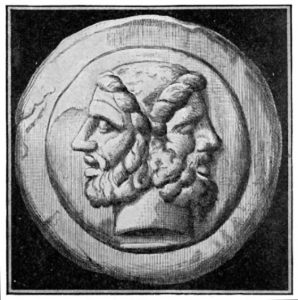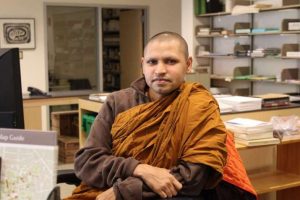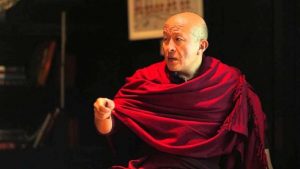
Venerable Upali Sraman, a Theravada Monk from Bangladesh, is an Emory University PhD candidate. The first Robert H. N. Ho Family Foundation scholar at Harvard Divinity School, where he earned a Master of Divinity, he is currently in residence at the Rangjung Yeshe Institute in Kathmandu. Ven. Upali recently gave a talk entitled “Is Theravada Really the Lower Vehicle?” which questioned some assumptions and perceptions of the Theravada lineage, such as whether Theravada contains a bodhisattva practice and where the term “Hinayana,” or “lesser vehicle” originated. I spoke to Ven. Upali about his talk and its potential to illuminate some commonly held stereotypes.
Buddhistdoor Global: What inspired you to write the talk?
Venerable Upali Sraman: I was inspired to give this talk having experienced that many people equate contemporary Theravada Buddhism with the what is referred to as Sthaviravada—a form of Hinayana Buddhism—in classical Buddhist texts. I think this is extremely simplistic and mistaken. Holding this view doesn’t allow us to understand that Theravada Buddhism has changed historically and philosophically. For instance, there is a misperception that there is no bodhisattva concept in Theravada Buddhism. Many people have said that to me. So I have attempted to clarify this misconception to some extent, because there is a rich theory of bodhisattva practice in Theravada Buddhism.
BDG: What responses have you received? Are they what you anticipated?
VUS: I have received positive responses from most of the participants. Many expressed enthusiasm to learn more about Theravada Buddhism.
BDG: What do you think are the larger implications of the talk for Buddhist studies and the future understanding of Buddhist studies?
VUS: I think we need to be very careful while introducing Buddhist traditions, especially to people coming into contact with Buddhism for the first time. Buddhism, of course, exists in many countries in different cultural formats, but I think we should not introduce these traditions in a way that creates fixed compartments in the minds of students because things change. Things we learn in an introductory class can be hard to unlearn in the future. Instead we need to take into account the fact that various historical, doctrinal, and even monastic disciplinary factors are involved in the way Buddhism has been preserved and presented to us.
For instance, Theravada Buddhism and Mahayana Buddhism grew side by side in Sri Lanka in the medieval period, influencing one another and sometimes even contesting each other’s practices and philosophical claims. Just labelling Sri Lankan Buddhism as Hinayana flattens this complex history. The same is true the other way also, when Theravada practitioners assume that Vajrayana or Tantric practices are not accurate Buddhism. Consequently, we not only make inaccurate assumptions about a tradition, we also deprive ourselves of the opportunity to learn important things that could enrich our own understanding and practice. So I think we need to be mindful that, yes, differences in Buddhist cultures and traditions exist, but how do we talk about these and how do we introduce these to new students?
BDG: What are some other places you would like to present the material?
VUS: I may present this at the International Buddhist Academy in Kathmandu and for anyone who is interested.
BDG: Besides continuing to research this topic of Theravada being perceived as a lesser vehicle, what are some of your other research interests currently?
VUS: Theravada being perceived as a lower vehicle is not necessarily a research interest of mine. My talk was intended to make people aware of the complex history of Theravada Buddhism and to encourage those of us studying Buddhism to not to come to simplistic conclusions about the history or doctrines of any particular tradition. Instead, we can learn a lot if we are mindful and think deeply about the categories we are taught at school and from popular manuals of Buddhism. I think it is just a matter of expanding our curiosity to reflect on why things are the way they are. I am currently working on improving my Tibetan to read Tibetan translations of Vinaya texts.
BDG: Would you say that there is one category or field that we can call “Buddhism,” or is perhaps more accurate to say “Buddhisms?” Or even, as is a term emerging in academia and elsewhere, “the Dharmic traditions?”
VUS: I think it is a good exercise to try to come out with inclusive terms like these. I also think it is important to use these terms mindfully and to clarify what we are trying to express when we give preference to one over another. Earlier, Buddhism was used to refer to the religious practices and texts of all people who identified as Buddhists—as if there were no differences between them. Now terms such as “Buddhisms” or “Dharmic traditions” are used to recognize the diversity of all the different Buddhist traditions. I think “Dharmic traditions” even includes Hinduism and Jainism. Still, there might be some ambiguity and vagueness in trying to find one broad expression that embraces many different traditions of practice. While recognizing the differences, we should not completely forget about the commonalities. So I think the question is not necessarily about which expression is more accurate than another; instead I think it is important to be clear about which terms we use and what we are referring to in a given context.
BDG: What do you hope for the future of Buddhism?
VUS: I hope that we will study Buddhist texts and cultures with an open mind—not merely learning high-flown Buddhist philosophical ideas and jargon in a mechanical way, but engaging with these ideas skillfully to expand, not limit, our imagination.
BDG: Thank you Venerable Upali Sraman!
See more
Upali Sraman – “Is Theravāda Really the Lower Vehicle?” (Soundcloud)











